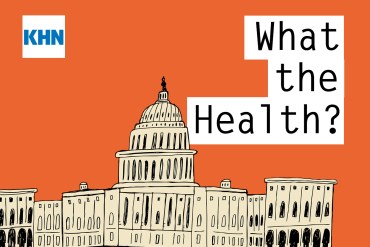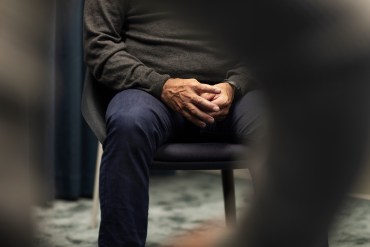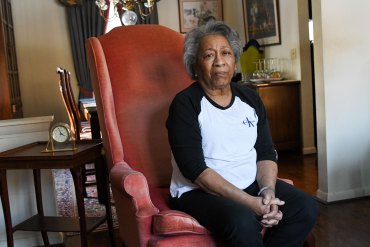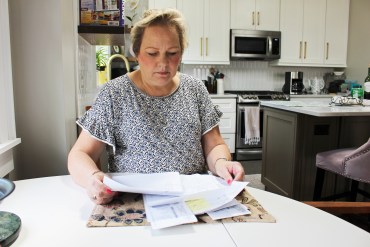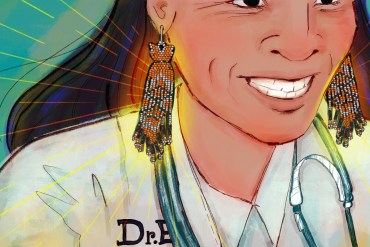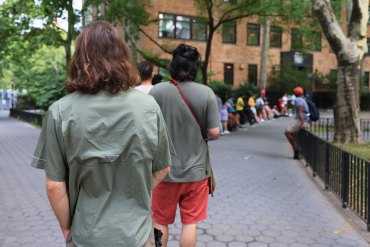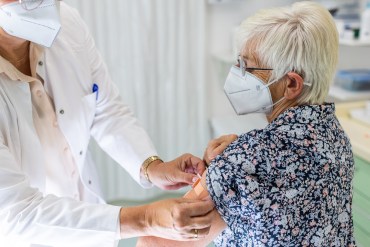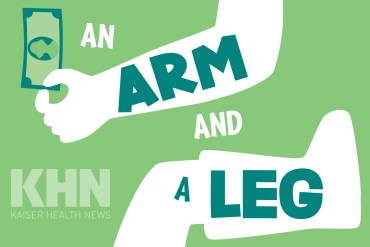Cognitive Rehab May Help Older Adults Clear Covid-Related Brain Fog
People whose brains have been injured by concussions, traumatic accidents, strokes, or neurodegenerative conditions such as Parkinson’s disease can benefit from targeted therapy. Experts also employ therapies for long-covid patients with memory and language problems.
KHN’s ‘What the Health?’: Kansas Makes a Statement
In the first official test vote since the Supreme Court overturned Roe v. Wade, voters in Kansas’ primary said in no uncertain terms they want to keep a right to abortion in their state constitution. Meanwhile, the Senate is still working to reach a vote before summer recess on its health care-climate-tax measure, but progress is slow. Tami Luhby of CNN, Sandhya Raman of CQ Roll Call, and Rachel Cohrs of Stat join KHN’s Julie Rovner to discuss these issues and more. Also this week, Rovner interviews KHN’s Bram Sable-Smith, who wrote the latest KHN-NPR “Bill of the Month” installment about a very expensive ambulance trip.
When Mental Illness Leads to Dropped Charges, Patients Often Go Without Stabilizing Care
When criminal suspects are deemed too mentally ill to go through the court process and their charges are dropped, they can be left without stabilizing treatment — and sometimes end up being charged with additional crimes.
Music Festivals Embrace Overdose Reversal Drugs, but Fentanyl Testing Kits Remain Taboo
Music festival promoters are allowing distribution of overdose reversal medication as fentanyl deaths continue to surge. But nonprofits and volunteers are often left to do the work, and more controversial forms of harm reduction aren’t openly allowed.
The US Mental Health Hotline Network Is Expanding, but Rural Areas Still Face Care Shortages
On July 16, a three-digit number, 988, became the centerpiece of a nationwide effort to unify responses to Americans experiencing mental health crises. But many people, especially those in rural areas, will continue to find themselves far from help if they need more support than call operators can offer.
Nursing Homes Are Suing the Friends and Family of Residents to Collect Debts
Debt lawsuits — long a byproduct of America’s medical debt crisis — can ensnare not only patients but also those who help sick and older people be admitted to nursing homes, a KHN-NPR investigation finds.
The Ambulance Chased One Patient Into Collections
After a car wreck, three siblings were transported to the same hospital by ambulances from three separate districts. The sibling with the most minor injuries got the biggest bill.
‘American Diagnosis’: Two Indigenous Students Share Their Path to Medicine
A lack of Native physicians means many tribal communities rely on doctors who don’t share their lived experience, culture, or spiritual beliefs. In Episode 9, meet two medical students working to join the ranks of Indigenous physicians.
Parents Become Drug Developers to Save Their Children’s Lives
Families affected by ultra-rare diseases are starting their own companies to speed the development of treatments for their kids, venturing into territory that traditional drugmakers deem too risky.
Fighting Monkeypox, Sexual Health Clinics Are Underfunded and Ill-Equipped
Sexual health clinics are scrambling to properly track, test, and treat hundreds of monkeypox patients. So far, it isn’t going well.
In Some States, Voters Will Get to Decide the Future of Abortion Rights
Measures to enshrine the right to abortion in the state constitution will be on the ballot in California and Vermont this fall. Abortion-rights advocates in Michigan are hoping their state will follow suit.
Conservative Blocs Unleash Litigation to Curb Public Health Powers
Spurred on by opposition to pandemic-related health mandates, a coalition of religious liberty groups, conservative think tanks, and Republican state attorneys general has filed a cascade of litigation seeking to rein in the powers of public health authorities.
Boost Now or Wait? Many Wonder How Best to Ride Out Covid’s Next Wave
As the country faces a rise in new infections driven by the omicron BA.5 subvariant of the coronavirus, about 70% of people 50 and older who got a first covid-19 booster shot haven’t received the recommended second one, according to the Centers for Disease Control and Prevention. Many undervaccinated Americans have lost interest, and others aren’t sure whether to get boosted again now or wait for vaccines reformulated to target newer strains of the virus.
Nurse Midwives Step Up to Provide Prenatal Care After Two Rural Hospitals Shutter Birthing Centers
Dozens of Iowa hospitals have closed their birthing units. A team of University of Iowa nurse midwives can’t reopen them, but they’ve found a way to provide prenatal checkups and other crucial services in two towns.
Rural Hospital Rescue Program Is Met With Skepticism From Administrators
A new federal rescue program that pays rural hospitals to shutter underused inpatient units and focus solely on emergency rooms and outpatient care hasn’t generated much interest yet.
Patients With Epilepsy Navigate Murky Unregulated CBD Industry
The FDA has approved a cannabis-derived drug, Epidiolex, to treat some forms of epilepsy. Now people who have other forms of the condition are using over-the-counter CBD products in hopes of taming their seizures. But doctors and patients worry about the unregulated world of CBD, in which product ingredients can be a mystery.
‘An Arm and a Leg’: One ER Doctor Grapples With the Inequities of American Health Care
This episode is an interview with Dr. Thomas Fisher, author of “The Emergency: A Year of Healing and Heartbreak in a Chicago ER.”
In America, Cancer Patients Endure Debt on Top of Disease
Medical breakthroughs mean cancer is less likely to kill, but survival can come at an extraordinary cost as patients drain savings, declare bankruptcy, or lose their homes, a KHN-NPR investigation finds.
The Search for Scarce Formula Is Worse for Rural Families on WIC
Constraints imposed by the Special Supplemental Nutrition Assistance Program for Women, Infants, and Children, known as WIC, that prevent recipients from using benefits to buy formula across state lines weigh on families as the nationwide formula shortage drags on.
The Push for Abortion Lawmaking After ‘Dobbs’ Is Unique, Legal and Political Experts Say
The surge of calls for special legislative sessions to pass abortion laws is an unusual occurrence in modern U.S. history, according to experts — one caused by the Supreme Court’s decision to give states more power to regulate abortion.





